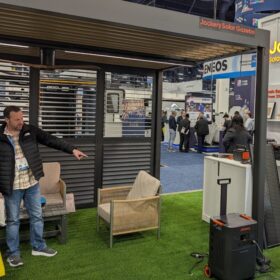The U.S. Department of Energy (DOE) announced more than $366 million for 17 projects across 20 states and 30 tribal nations and communities, to build resilience and energy security in rural and remote areas across the country.
This funding from the Bipartisan Infrastructure Law is intended to support community-driven energy projects, such as microgrids for community health centers, which strengthen energy security and delivers economic opportunities in rural and remote regions.
Rural and remote communities face a unique set of energy challenges and often have higher electric bills, unreliable energy supplies and some have no access to electricity at all. For example, 21% of Navajo Nation homes and 35% of Hopi Indian Tribe homes remain unelectrified, according to a 2022 report by DOE’s Office of Indian Energy. Low-income residents consistently face an energy burden three times higher than other households, according to the DOE.
The projects are part of DOE’s Energy Improvements in Rural or Remote Areas (ERA) program, which is managed by the DOE Office of Clean Energy Demonstrations (OCED). The selected projects cover a range of clean energy technologies, from solar, battery storage systems and microgrids to hydropower, heat pumps, biomass, and electric vehicle charging infrastructure.
Of the 17 funded projects, 12 are solar and 11 of those include energy storage. At least 12 projects will support tribal communities, such as the Navajo and Hopi Nations, who plan to install solar and battery energy storage systems to provide electricity for 300 homes. Another project expects its proposed tribal clean energy projects to save every Taos Pueblo household in its service area an estimated $700 per year by transitioning to clean energy.
Examples of projects selected for award negotiation include:
- The Solar + Storage Microgrids for Rural Community Health Centers Project: (Alabama, Florida, Georgia, Kentucky, Mississippi, North Carolina, South Carolina, Tennessee): The CHARGE Partnership plans to build energy resilience in Community Health Centers to improve access to reliable health care in low-income, rural communities across eight states in the southeast. The clean, resilient energy systems developed through this project will benefit up to 175 health center sites, ensuring energy reliability and continuity of care during emergencies and power outages. DOE estimates that participating health centers could save up to $45 million in energy costs, avoid millions in losses due to closures, decrease greenhouse gas emissions, and create a scalable, replicable model for remote health care providers, strengthening the resilience of vulnerable communities.
- Resilience and Prosperity in Rural Northern Wisconsin (24 sites across Red Cliff Band Tribal Lands and Bayfield County, Wisconsin): This project seeks to increase regional energy reliability with the deployment of 23 microgrid systems. Wisconsin’s Office of Sustainability and Clean Energy (OSCE) will promote local workforce development. OSCE also aims to deploy solar power, battery storage, smart controls to enable islanding, and electric vehicle charging stations.
- Energizing Rural Hopi and Navajo with Solar Powered Battery-Based Systems (Navajo and Hopi communities in Arizona, New Mexico, and Utah): This project plans to install 2.5 kW off-grid solar and battery storage systems to electrify 300 tribal homes, enhancing energy resilience and increasing electrification rates within the community. The project lead, Native Renewables Inc., is committed to an Indigenous-led workforce and has developed a program to increase the number of tribal solar-installation professionals. They will also host training and education for participating households on solar electric energy systems and best practices to ensure the longevity of battery storage systems. his electrification project will fulfill essential household power needs.
Learn more about the 17 projects selected for award negotiation here.
This content is protected by copyright and may not be reused. If you want to cooperate with us and would like to reuse some of our content, please contact: editors@pv-magazine.com.









By submitting this form you agree to pv magazine using your data for the purposes of publishing your comment.
Your personal data will only be disclosed or otherwise transmitted to third parties for the purposes of spam filtering or if this is necessary for technical maintenance of the website. Any other transfer to third parties will not take place unless this is justified on the basis of applicable data protection regulations or if pv magazine is legally obliged to do so.
You may revoke this consent at any time with effect for the future, in which case your personal data will be deleted immediately. Otherwise, your data will be deleted if pv magazine has processed your request or the purpose of data storage is fulfilled.
Further information on data privacy can be found in our Data Protection Policy.